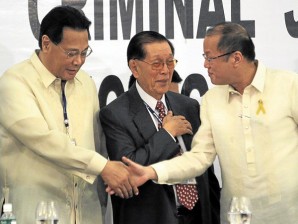
WIDENING RIFT President Aquino shakes hands with Supreme Court Chief Justice Renato Corona as Senate President Juan Ponce Enrile stands in the middle, moments after the President lets loose another broadside against the high tribunal during the first National Criminal Justice Summit held at the Manila Hotel on Monday. NIÑO JESUS ORBETA
Could President Benigno Aquino III and Chief Justice Renato Corona sit down as gentlemen and resolve their differences privately?
Senators made this suggestion yesterday following President Aquino’s latest tirade against the Supreme Court at the First National Criminal Justice Summit.
Senators Panfilo Lacson and Francis Escudero said avenues for dialogue include the Legislative-Executive Development Advisory Council and the Judicial Executive Legislative Advisory and Consultative Council.
Senate President Pro Tempore Jose “Jinggoy” Estrada volunteered to mediate, but Senate President Juan Ponce Enrile said legislators had better not intervene and suggested that the Catholic Church and other religious groups, “as peacemakers,” mediate.
Lacson warned that the President’s attitude toward the Supreme Court could be replicated at the local level and “lead to anarchy.”
“If this is what they witness in the national level, a governor might be encouraged to defy the local judge and not implement his decision. Or a mayor can defy a metropolitan trial court regarding an ordinance. The situation could get worse,” Lacson said in an ambush interview.
“I’m not saying the President’s message is wrong, but it was delivered at the wrong occasion,” he said.
Tone down rhetoric
Enrile said the President and the Chief Justice “must tone down the rhetoric.”
“The President is entitled to his position, to criticize what he perceives to be not in accord with the Constitution but in the final end, it is the Supreme Court that interprets it,” he noted.
“I would suggest that the best way is for the Catholic Church and the other churches to talk to both sides. They are the peacemakers,” Enrile said. “We must look for a neutral body.”
Senator Gregorio Honasan warned against continued attacks on the high tribunal.
“It is not good for our people and the international community to witness the protracted tension among branches of government. If we erode the credibility or impartiality of the highest court of the land, what are the alternatives? Where do we run to for resolution?” Honasan asked.
In an interview, House Minority Leader Edcel Lagman expressed disgust. “I think this is really an act of recidivism,” he said, pointing to the President’s assault on Corona at the Makati Business Club anniversary on Thursday.
“The reaction of those present and those who knew about his speech was really adverse, and now he did at again,” Lagman said.
Inciting mob rule
Zambales Representative Milagros Magsaysay said Mr. Aquino was conditioning the minds of the people.
“He wants the people to distrust that institution and because they are also afraid that if they lose a lot of cases in the Supreme Court, it’s not because the court ruled based on the rule of law but based on partisan politics,” Magsaysay said. “I think it’s a very irresponsible statement.”
Quezon Representative Danilo Suarez believed that Mr. Aquino was inciting “mob rule.”
Quezon City Representative Winston Castelo called for full disclosure, transparency and accountability of the Supreme Court which he said was “wrapped in secrecy.”
He said a special audit of the Judiciary Development Fund from litigants’ fees would allow people to know whether the billions of pesos collected were being dispensed properly. “It’s time the Supreme Court does its own reexamination of conscience.”
Justice Secretary Leila de Lima said the President was just articulating the executive’s perspective that the court had been “apparently restricting or impairing our prerogative in our own mandate to exact justice and accountability.”
“I don’t think there’s any disrespect,” she said. “For those who are fearful of a possible constitutional crisis, that one is farfetched.”
Setting standards
Amado Valdez, law dean of the University of the East, said Mr. Aquino had the right to articulate his views.
“The President is speaking from the political side of the issue, not strictly the judicial aspect of the case. By political side, I mean the concern of the public about how the government should exercise its mandate,” Valdez said.
“[The President] should articulate the people’s wishes. The Supreme Court’s function is to temper [this] and make a proper evaluation, maybe it is mob rule, or explain the collective wisdom of the people,” he added.
Valdez also said Mr. Aquino’s statements should not be considered as an intimidation of the court.
“It must be taken by the Supreme Court as a wake up call that the matter is brought to the attention of the people and therefore, the Supreme Court has to act with the people’s collective intuition of what’s right and wrong,” he said.
Valdez also said the executive and the judiciary in this administration were adjusting to each other.
“In the process of making this adjustment they will find a working arrangement,” he said. “Eventually, both sides will see they have more reasons to agree on if they have the people’s interest in mind.”
Valdez said the times “require more frank and candid statements.”
“It’s not the time for measured statements,” he said, given the gravity of the country’s problems.
Mr. Aquino, by making such statements, is also setting a high standard for himself, Valdez said. That would be the standard by which he would be measured, he added. With reports from Marlon Ramos, Leila B. Salaverria and Jeannette I. Andrade